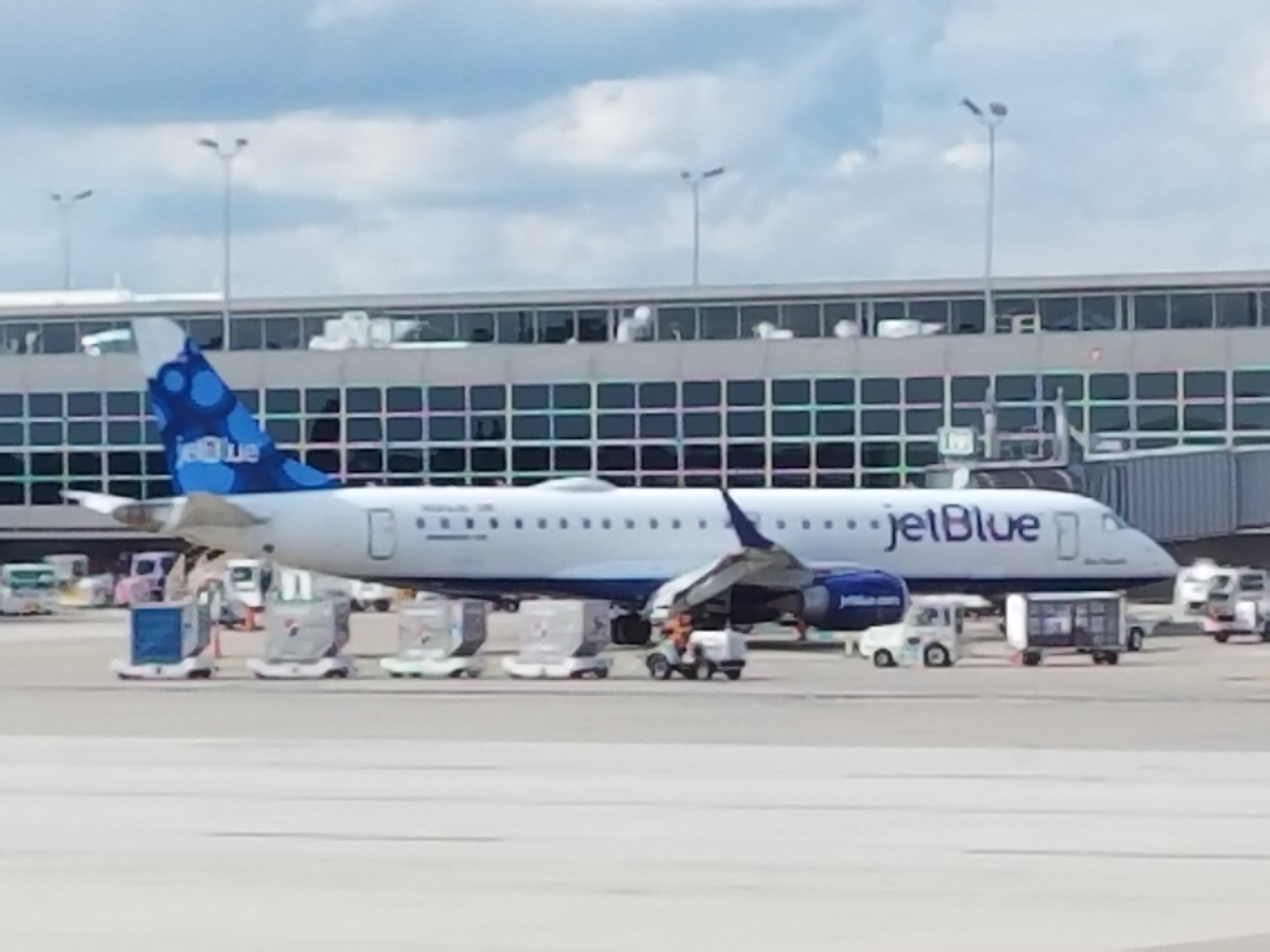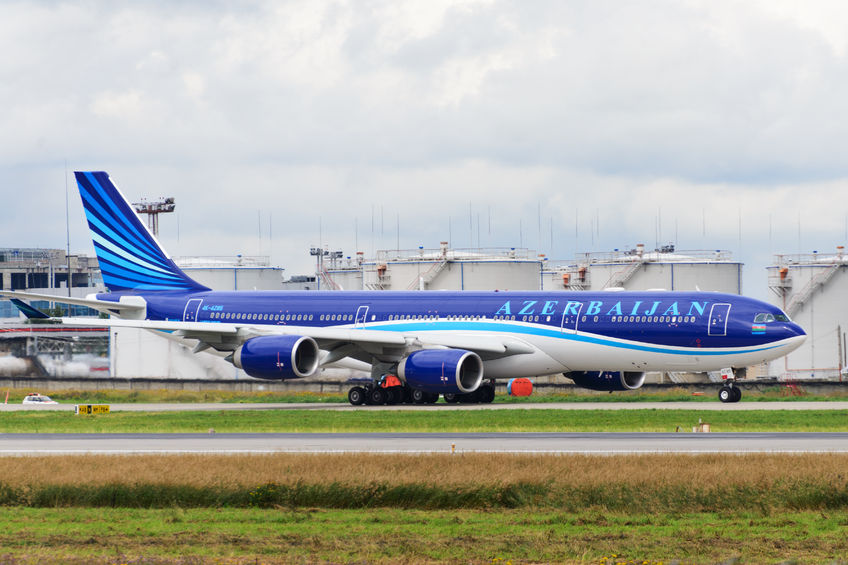Yesterday’s JetBlue flight 915 from New York JFK to San Francisco departed on time but made it to San Francisco more than 3 hours late because the aircraft had to divert to Grand Rapids because “the lithium battery in a passenger’s laptop” which was “stowed away in backpack in an overhead bin” caught fire.
Fliers first realized something was wrong when they noticed smoke coming from row 25.
“I was stunned,” said passenger Kat Honniball. “I knew something was going to happen because you know, lithium batteries catching on fire when you’re up at 38,000 feet, you can’t help but think you gotta do something, so I was prepared for it.”
…The flight crew put out the fire and emergency crews removed the damaged equipment after landing.

Flight crews can put out a lithium ion battery fire when the device is in the cabin. Indeed the fire was out before the plane landed in Grand Rapids.
When lithium ion batteries catch fire in the cargo hold there’s far less that they can do. That’s why lithium ion batteries have been banned from checked luggage, at least until the US government banned electronics larger than a standard cell phone from passenger cabins on flights from certain Mideast airports (while allowing those who wish to bring on dangerous iPads to connect on their way to the U.S.).

Terrorists Can Circumvent the Laptop Ban by Flying Dubai – Baku – New York JFK instead of Emirates Non-stop, copyright: nordroden / 123RF Stock Photo
Airline executives know that an electronics ban is stupid, but they’re afraid to speak up for two reasons. The head of United’s pilots union is nearly alone in speaking out, offering “Lithium-ion batteries are clearly hazardous — I don’t want a hazardous device in my cargo hold.”
It makes sense for airline executives to remain quiet, even if it compromises safety, since none of them will be blamed for a catastrophic fire in the cargo hold.
Airlines are one of the most heavily regulated industries in the country. Airline ‘deregulation’ just means the government no longer tells airlines what routes to fly and the federal government no longer sets prices of airline tickets. The federal government:
- directly manages air traffic control and oversees safety.
- imposes taxes specifically on flights.
- decides which passengers are allowed to fly.
- grants foreign travel rights.
- exercises a tight grip on local governments which generally own and manage airports (through covenants that accompany grants).
In addition, US airlines want favors from the government like protection from foreign competition.
Airline executives are loath to offend their regulators who hold US airline futures in their hands by speaking against the federal government.
And the regulated airlines, just like regulators themselves, have a conservative bias. Just like the FDA has to be absolutely sure that a drug is safe before allowing it to be sold, rather than balancing risks, and as a result delays life saving drugs — patients die in the mean time — because they don’t want to be blamed for getting something wrong, security regulators are loathe to relax restrictions for fear of future blame.
It’s why we still have a liquid ban despite so many fits and starts suggesting it could end. And it’s why even when the TSA has asked to stop screening for hockey sticks Congress wouldn’t let them focus on finding actually dangerous items a terrorist might want to bring on a plane.
We learned yesterday that an electronics ban on flights from Europe to the U.S. isn’t imminent although the U.S. refuses to take the option off the table entirely. However it remains in place for flights from the Mideast, making those flights less safe.
It’s entirely understandable why most in the airline industry are too afraid to speak out. But since safety is so crucial in aviation, it’s important that they make their voices heard.


According to CBS, this fire was not from the batteries in a laptop, as you stated, but from a portable laptop charger in the backpack.
@Dickinson – It’s good to clarify, but wouldn’t that also be relegated to the cargo hold for flights to the US from the Middle East? Isn’t it still an electronic device larger than a cell phone?
Airline executives have ways of influencing regulators and politicians without speaking out. Right now they are probably pretty happy with the status quo with the ME3 being disadvantaged. They wouldn’t want to upset that apple cart. Mounting a public campaign might also have legal and PR consequences in the event of a disaster.
If there really is a real chance of producing a laptop bomb in a laptop that can pass the turn-on test and the explosives are not otherwise detectable, than banning laptops completely — even as cargo — is wise.
@john I agree. The US airlines are happy about this as long as it’s not expanded to them. They got nothing to lose for now so why say anything.
So this whole electronic ban is simply a ploy to disturb the passenger (and ultimately revenue) of ME3, who were accused as being the reasons of inter alia: uncompetitive free sky policy (being being state owned company); the thousands american losts their job opportunity; american army/navy have trouble transporting their troops.
I don’t mean to be racist, but this kind of policy by a government would reflect on the nation of the people. And it wouldn’t be too far to say its a hypocrite nation. So sad…
Perhaps laptops on aircraft might be safer within a fire-proof bin within the cargo hold.
Having said that, I think there needs to be a realization that we live in a very litigious society and it is somewhat naive to think that the CEO of a major airline or pharmaceutical company can ignore that potential risk. There is rarely a perfect answer/solution, yet someone is always ready to sue when something goes awry.
@Ron: wow… surely something is terribly wrong with the legal system of the place you are living right now. Human made and implement laws to help human lives. If the result is contradictory, why make laws then?
Hmm, a dubious quality 18650 battery in a dubious quality charger. I’m not sure that should be allowed to be imported, let alone in an aircraft.
So Gary, before the prohibition of electronic devices on flights originating in certain Mideastern countries, was it not allowed to check these devices in the hold? And now, because of the prohibition on carrying them on, it all of a sudden is allowed to check them? That’s how I understand your sentence “That’s why lithium ion batteries have been banned from checked luggage, at least until the US government banned electronics… on certain flights originating from Mideast airports.”
Spare lithium ion batteries have been banned in checked baggage worldwide for the past year. Many airlines do allow a single lithium ion battery to be checked if installed in a device.
UPS, FedEx, and the USPS all consider lithium ion batteries to be hazardous materials. They have to be declared, marked on box, packaged properly as hazardous materials. Packages with Li-Ion batteries are placed in a cargo container that the flight crews can access during flight. Biggest problem with these batteries, is the fire is difficult to extinguish. Now imagine how the hold of passenger plane could have a fire and with multiple Li-Ion batteries, there is no way to extinguish that type of fire. UPS Flight 6 crashed in Dubai, killing the crew from a Li-Ion battery fire. That happened in Sept., 2010. With all the regulations for air carriers with these batteries, why is DHS making this ban? Everyone knows how dangeous these batteries are in checked bags.
Currently I am Asia. I have flown many carriers. Every carrier asked me if I had packed litihium batteries. And, if I had, they wanted the batteries removed from the checked bags. Which goes back to Gary’s hypothesis. With this administration, who knows?
I’d like to remind everyone, that it was not that long ago, that we had to put up with second hand cigarette smoke, not only on board commercial aircraft, but also in the airline terminals. Even though flight attendants had complained for years, about the medical effects of second hand smoke, their complaints fell on deaf ears by the airline executives. It wasn’t until the late Sen. Frank Lautenberg, of New Jersey, sponsored legislation that effectively banned smoking on domestic airliners. The five hundred plus commercial airports in the USA were slower to act, but smoking was finally in the terminals. Little by little, the foreign airliners, finally followed suit. Over the years, there have been idiotic passengers who have sought to circumvent that ban, and are caught trying to light up in the aircraft. Such passengers have been caught, and prosecuted. Unfortunately, the same mentality holds true for electronic devices; not only am I for banning laptops on international flights, but I would ban them domestically, also. A fire in an aircraft cabin at a high altitude, is extremely dangerous. Secondly, I would like the ban to apply to cell phones, also. There have been many instances whereby passengers refuse to obey the crew’s instructions, and keep blabbing away on their cell phones, in such a loud manner, that it interferes with the instructions of the flight crew.
“Unfortunately, the same mentality holds true for electronic devices; not only am I for banning laptops on international flights, but I would ban them domestically, also.”
My business travel subsidizes your apparently non-business travel. As a small business owner, I don’t have the luxury of shipping laptops around as cargo. Keep that in mind when you want to ban business travel.